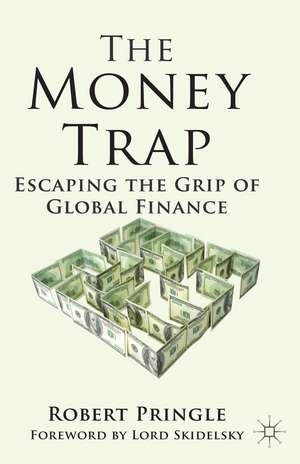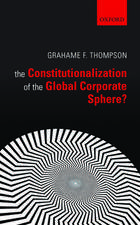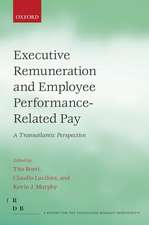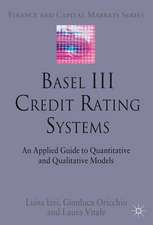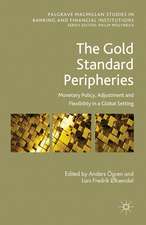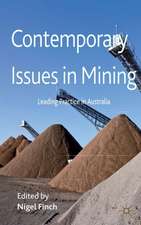The Money Trap: Escaping the Grip of Global Finance
Autor R. Pringleen Limba Engleză Paperback – 7 iun 2014
| Toate formatele și edițiile | Preț | Express |
|---|---|---|
| Paperback (1) | 731.91 lei 6-8 săpt. | |
| Palgrave Macmillan UK – 7 iun 2014 | 731.91 lei 6-8 săpt. | |
| Hardback (1) | 730.16 lei 6-8 săpt. | |
| Palgrave Macmillan UK – 7 iun 2014 | 730.16 lei 6-8 săpt. |
Preț: 731.91 lei
Preț vechi: 892.57 lei
-18% Nou
Puncte Express: 1098
Preț estimativ în valută:
140.07€ • 145.69$ • 115.63£
140.07€ • 145.69$ • 115.63£
Carte tipărită la comandă
Livrare economică 14-28 aprilie
Preluare comenzi: 021 569.72.76
Specificații
ISBN-13: 9781137366900
ISBN-10: 1137366907
Pagini: 300
Ilustrații: XXVII, 300 p.
Dimensiuni: 140 x 216 x 23 mm
Greutate: 0.57 kg
Ediția:2014
Editura: Palgrave Macmillan UK
Colecția Palgrave Macmillan
Locul publicării:London, United Kingdom
ISBN-10: 1137366907
Pagini: 300
Ilustrații: XXVII, 300 p.
Dimensiuni: 140 x 216 x 23 mm
Greutate: 0.57 kg
Ediția:2014
Editura: Palgrave Macmillan UK
Colecția Palgrave Macmillan
Locul publicării:London, United Kingdom
Cuprins
PART I: IN THE TRAP Into the Danger Zone Why Players Need a New Rulebook How Monetary Systems are Born World Money without an Anchor PART II: SEARCHING FOR WAYS OUT Improving National Policies A Solution for the Eurozone Money International PART III: FOUR KEY ISSUES Those Global Imbalances The Reserve Currency Overhang Can Banks Be Made Safe? Markets, States and Bubbles PART IV: HARNESSING THE POWER OF GLOBAL FINANCE 100 Years of Currency Plans The Choice of the Standard Towards a Real Global Currency The Emerging Global Financial System
Recenzii
"The Money Trap looks deeply at the fundamental problems of reforming the international monetary system. Since the end of Bretton Woods, the world economy has not had rules that guided markets toward an efficient equilibrium that benefitted large and small countries. Pringle shows why current international arrangements repeatedly bring crises." - Allan Meltzer, University Professor of Political Economy, Carnegie Mellon University, USA
"In this lucidly written and wide-ranging treatment of the global financial crisis, Robert Pringle traces the modern historical origins of the crisis and draws together many elements of the story. Among the scores of books on the crisis, this one stands out for the accessibility of the account and the clear proposals it advances. It will be read with profit by all manner of practitioners and commentators." - Forrest Capie, Professor Emeritus in Economic History, CASS Business School, London, UK
"The Money Trap embodies an original, ambitious, bold, and provocative approach to the subject of the crisis and the monetary system A valuable addition to the literature available for policy makers, analysts, academics and participants in financial markets." - Dr. Y. V. Reddy, Former Governor, Reserve Bank of India
"This work is probably the most ambitious - and also relevant - attempt to explain the set of causes that led to the disasters of 2007 and following years. It proposes solutions based on economic literature andon the personal views of an author who has devoted most of his career to this fundamental subject. The analysis is fundamental not only for specialists but, more importantly, also for our society. It is a book that should be read by government officials, economists, students and citizens." - Jacques de Larosière, Managing Director of the International Monetary Fund (1978-87), Governor of the Banque de France (1987-93)
"It is always very important to review history, particularly the history of past mistakes. By doing that, we can see how we should behave in the future when similar crises hit us. Robert Pringle's book does exactly that. It contributes greatly to our understanding of the present international financial system." - Eisuke Sakakibara, Professor of Waseda University, Tokyo, Former Vice Minister of Finance and International Affairs of Japan
"This book cuts through all the carping and obfuscation to pinpoint the biggest burden on business enterprise: the lack of reliable money." - Graham Bannock, Co-author (with R.E.Baxter), The Palgrave Encyclopedia of World Economic History
"In this lucidly written and wide-ranging treatment of the global financial crisis, Robert Pringle traces the modern historical origins of the crisis and draws together many elements of the story. Among the scores of books on the crisis, this one stands out for the accessibility of the account and the clear proposals it advances. It will be read with profit by all manner of practitioners and commentators." - Forrest Capie, Professor Emeritus in Economic History, CASS Business School, London, UK
"The Money Trap embodies an original, ambitious, bold, and provocative approach to the subject of the crisis and the monetary system A valuable addition to the literature available for policy makers, analysts, academics and participants in financial markets." - Dr. Y. V. Reddy, Former Governor, Reserve Bank of India
"This work is probably the most ambitious - and also relevant - attempt to explain the set of causes that led to the disasters of 2007 and following years. It proposes solutions based on economic literature andon the personal views of an author who has devoted most of his career to this fundamental subject. The analysis is fundamental not only for specialists but, more importantly, also for our society. It is a book that should be read by government officials, economists, students and citizens." - Jacques de Larosière, Managing Director of the International Monetary Fund (1978-87), Governor of the Banque de France (1987-93)
"It is always very important to review history, particularly the history of past mistakes. By doing that, we can see how we should behave in the future when similar crises hit us. Robert Pringle's book does exactly that. It contributes greatly to our understanding of the present international financial system." - Eisuke Sakakibara, Professor of Waseda University, Tokyo, Former Vice Minister of Finance and International Affairs of Japan
"This book cuts through all the carping and obfuscation to pinpoint the biggest burden on business enterprise: the lack of reliable money." - Graham Bannock, Co-author (with R.E.Baxter), The Palgrave Encyclopedia of World Economic History
Notă biografică
Robert Pringle, the chairman and founder of Central Banking journal, is a financial commentator, economics editor and entrepreneur. He has devoted his career to reporting and analysing developments in the international money and capital markets and the international monetary system. His experience gives him a unique perspective on the dramatic changes that have occurred in global economics and finance and the problems that face the world economy now. He has held senior positions on The Economist, The Banker (as editor), the Group of 30 (a well-known think tank of which he was the first director), and at the WIDER Institute of the United Nations University. He has also served as a consultant to leading commercial banks and to governments on economic policy issues. He founded Central Banking Publications in 1990 and has built it into a leading source of independent information and commentary on the activities of central banks around the world. He has interviewed numerous central bank governors and has commissioned and published original work by many leading international economists.
